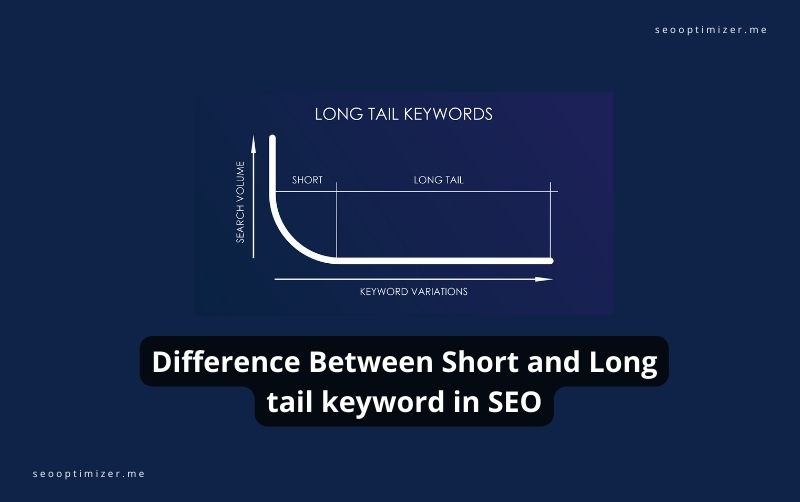Difference Between Short and Long tailed keywords in SEO

Long-tailed keywords and short-tailed keywords in keyword research are important steps in SEO. It is also a known concept that SEO experts frequently use. These two types of keywords have different purpose, reach, and impact on SEO strategies.
The difference between long-tail and short-tail keywords lies in their specificity, competition, search volume, and conversion potential. While short-tail keywords may bring in more traffic, long-tail keywords offer a more targeted approach to SEO.
Also read: Best Guide for Keywords Usage in SEO
Also read: 7 Steps To Grow your Domain Authority
What Are Long Tailed Keywords?
Long-tail keywords are specific and highly descriptive search phrases that consist of three or more words. These. They mostly consist of three or more words that capture the searcher's intent more precisely. For instance, for a website selling running shoes, long-tail keywords could be "women's lightweight running shoes" or "best trail running shoes for beginners."
Advantages of Long Tailed Keywords
The characteristics of long-tail keywords include:
1. Niche Focus:
Long-tail keywords are niche-focused and are specific to certain audiences. They are less competitive, which means it's often easier to rank for them.
2. Lower Search Volume:
Long-tail keywords have a lower search volume compared to short-tail keywords. However, they bring in more targeted traffic, as they align closely with the searcher's intent.
3. High Specificity:
Long-tail keywords are highly specific, revealing a lot about what the searcher is looking for. This specificity allows website owners to create content and product offerings that precisely match the user's needs.
Also read: Beginners Guide to ON-Page SEO
Also read: Beginners Guide to OFF Page SEO?
4. Conversion Potential:
Because long-tail keywords attract visitors with a clear intent, they often have a higher conversion potential. The visitors in this case are more likely to make a purchase, sign up for a newsletter, or take other desired actions.
What Are Short-Tail Keywords?
Short-tail keywords, often referred to as "head" keywords, are brief and general search terms. They typically consist of one or two words. For example, if you were running a website that sells running shoes, short-tail keywords might include terms like "running shoes," "athletic shoes," or simply "shoes."
Advantages of Short-Tailed Keywords
The advantages and characteristics of short tail keywords include:
1. Broad Appeal:
Short-tail keywords have a broader appeal, which makes them highly competitive. Many websites and businesses target these keywords, leading to fierce competition for search engine rankings.
Also read: 14 Top SEO Experts in the SEO Industry
2. High Search Volume:
Short-tail keywords often have a higher search volume, which means that more people are searching for these terms. However, this can also mean a higher bounce rate, as searchers may not find the specific information they are looking for.
3. Lack of Specificity:
Due to their general nature, short-tail keywords lack specificity. They don't provide much information about the searcher's intent, making it challenging to deliver relevant content.
4. Generic Traffic:
While ranking for short-tail keywords can result in a significant amount of traffic, this traffic is often less targeted. Visitors may be seeking a wide range of information, products, or services, making it harder to convert them into customers.
Also read: How to Optimize Website Speed For SEO
Also read: The Significance of Mobile Optimization in SEO
Short-tail and Long-tail keywords Major Differences
| Aspect | Short-Tail Keywords | Long Tail Keywords |
| Keyword Length | Typically 1-2 words | 3 or more words |
| Specificity | General and less specific | Highly specific and descriptive |
| Search Volume | High search volume | Lower search volume |
| Competition | High competition | Lower competition |
| User Intent | Less clear user intent | Clear and focused user intent |
| Conversion Potential | Lower Conversion Potential | Higher Conversion Potential |
What's Next –
Start SEO Optimization. Analyze your website with Free SEO Optimizer
Audit your website for Free - SEO audit free
Suggested reads:
Also read: SEO for Beginners – Ultimate Guide
Also read: RoadMap to Becoming An SEO Expert
Also read: 15 Top SEO Experts and Specialists
Also read: AI SEO – The Impact of Artificial Intelligence on SEO Strategies
Also read: Google Indexing and How Web Crawler Works




